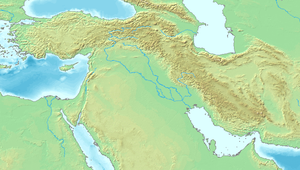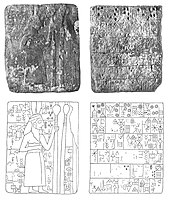Lugalshaengur (Sumerian: 𒈗𒊮𒇉, Lugal-sha-engur), (c. 2600 BCE), was ensi (governor) of the Sumerian city-state of Lagash.[3]
| Lugalshaengur 𒈗𒊮𒇉 | |
|---|---|
| Governor of Lagash | |
  Head of a votive mace with a lion-headed eagle (emblem of god Ningirsu) and six lions, dedicated at a shrine in Girsu by King Mesilim of Kish. Inscription in archaic script: “Mesilim, king of Kish, builder of the temple of Ningirsu, brought [this mace head] for Ningirsu, Lugalshaengur [being] prince of Lagash”.[1] Louvre Museum.[2] | |
| Reign | c. 2600 BC |
| Predecessor | En-hegal |
| Successor | Ur-Nanshe |
| Dynasty | 1st dynasty of Lagash |
Lugalshaengur was governor of Lagash, circa 2600 BCE.
The First dynasty of Lagash is dated to the 25th century BCE. Lugalshaengur was tributary to Mesilim.[citation needed] Following the hegemony of Mesannepada of Ur, Ur-Nanshe succeeded Lugalshaengur as the new high priest of Lagash and achieved independence, making himself king. He defeated Ur and captured the king of Umma, Pabilgaltuk.[4][5]
Lugalshaengur is known by an inscription on the head of a mace dedicated by King Mesilim of Kish, who was therefore contemporary with him.[3][6]
-
Transcription of the tablet.
See also
editReferences
edit- ^ "CDLI-Found Texts". cdli.ucla.edu.
- ^ "Masse d'armes du roi Mesilim". Louvre Museum. 2020.
- ^ a b Katz, Dina (1993). Gilgamesh and Akka. BRILL. p. 13. ISBN 978-90-72371-67-6.
- ^ Sayce, Archibald Henry; King, Leonard William; Jastrow, Morris (1911). . In Chisholm, Hugh (ed.). Encyclopædia Britannica. Vol. 3 (11th ed.). Cambridge University Press. pp. 99–112.
- ^ Katz, Dina (1993). Gilgamesh and Akka. BRILL. p. 13. ISBN 978-90-72371-67-6.
- ^ "CDLI-Found Texts". cdli.ucla.edu.
- ^ "Louvre Museum Official Website". cartelen.louvre.fr.
Bibliography
edit- Vojtech Zamarovský, Na počiatku bol Sumer, Mladé letá, 1968 Bratislava
- Plamen Rusev, Mesalim, Lugal Na Kish: Politicheska Istoriia Na Ranen Shumer (XXVIII-XXVI V. Pr. N. E.), Faber, 2001 (LanguageBulgarian) [(Mesalim, Lugal of Kish. Political History of Early Sumer (XXVIII–XXVI century BC.)]

![King priest on a votive tablet to Ningirsu, around the time of Lugalshaengu, before Ur-Nanshe. Found in Girsu, near Lagash. Louvre Museum.[7]](http://up.wiki.x.io/wikipedia/commons/thumb/4/4c/Carved_figure_feathers_Louvre_AO221.jpg/170px-Carved_figure_feathers_Louvre_AO221.jpg)

